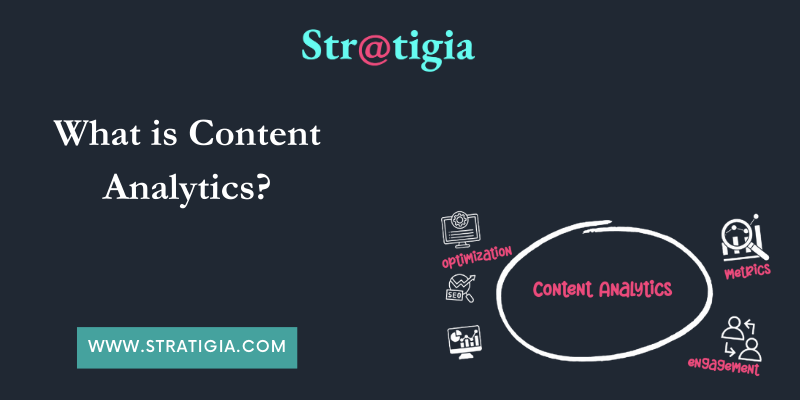Content analytics refers to collecting, analyzing, and interpreting data related to digital content performance. It helps marketers, publishers, and businesses understand how their content is consumed, how users interact with it, and what improvements can be made to enhance user engagement and conversion rates. Unlike web analytics, which focuses on website traffic, content analytics provides deeper insights into the effectiveness of content strategies across multiple platforms, including blogs, social media, and video channels.
By leveraging content analytics tools, businesses can make data-driven decisions to optimize their content marketing strategies and improve search engine optimization (SEO).
Learn more about content strategy optimization through our content optimization services.
What Are the Advantages of Content Analytics?
Understanding Audience Engagement
Content analytics helps businesses understand how their target audience interacts with different types of content. Marketers can assess which content formats are the most effective by monitoring engagement metrics such as time on page, scroll depth, and click-through rates.
Improving Content Strategies
With content intelligence, businesses can refine their content strategy by identifying content gaps, optimizing underperforming pieces, and focusing on high-performing content that resonates with their audience.
Impact on Brand Awareness and Sales
Content analytics provides actionable insights into how content contributes to brand awareness and sales enablement. By tracking conversion rates, businesses can determine the ROI of their content marketing efforts.
Key Metrics in Content Analytics
Production Metrics
Production metrics measure the volume of content created within a specific timeframe. This includes the number of blog posts, social media updates, and video content published.
Engagement Metrics
Engagement metrics track user interactions with content, including:
- Bounce rates
- Time spent on page
- Social media shares
- Comments and likes
Performance Metrics
Performance metrics evaluate the effectiveness of content by analyzing:
- Organic traffic
- Keyword rankings
- Content conversions
- Sales funnel impact
Differences Between Content Analytics and Web Analytics
Focus Areas of Content Analytics
Content analytics focuses on:
- Content effectiveness
- Audience behavior
- Conversion tracking
Metrics Tracked in Web Analytics
Web analytics, on the other hand, monitors:
- Website Traffic
- Page views
- Sessions and bounce rates
- Referrals and traffic sources
Learn more about data-driven content performance on our Content Strategy Agency.
Tools for Content Analytics
Overview of Popular Content Analytics Tools
Some of the most widely used content analytics platforms include:
- Google Analytics: Tracks website performance and user engagement.
- ContentSquare: Provides insights into user experiences and behaviors.
- HubSpot Analytics: Helps measure content conversions and marketing ROI.
How to Choose the Right Tool for Your Needs
When selecting a content analytics solution, businesses should consider:
- Integration with existing platforms
- Ease of use and reporting capabilities
- Scalability for growing content needs
Implementing Content Analytics
Setting Objectives and Goals
Before analyzing content, businesses must define clear objectives. Common goals include:
- Increasing user engagement
- Boosting organic traffic
- Enhancing conversion rates
Collecting Data from Various Platforms
Content analytics tools aggregate data from multiple sources, including:
- Websites and blogs
- Social media platforms
- Email marketing campaigns
Analyzing Data and Extracting Insights
Once data is collected, businesses must interpret key content marketing metrics to identify patterns, trends, and opportunities for optimization.
Best Practices for Content Analytics
Regularly Reviewing Metrics
Successful content marketing teams conduct routine content audits to measure content effectiveness and identify areas for improvement.
Adapting Strategies Based on Insights
Data-driven adjustments allow businesses to refine content formats, optimize SEO efforts, and improve content performance.
Collaborating Across Teams for Improved Results
Marketing, sales, and content creation teams should align their strategies using custom dashboards to track shared performance goals.
Challenges in Content Analytics
Data Overload
With the vast amount of digital content produced, businesses often struggle to filter valuable insights from irrelevant data.
Ensuring Data Accuracy
Content analytics relies on accurate data tracking. Inconsistent tracking can lead to misleading conclusions and poor content marketing decisions.
Aligning Analytics with Business Goals
For content analytics to be effective, businesses must ensure their analytics strategies align with their overall marketing goals.
Future Trends in Content Analytics
AI and Machine Learning in Content Analysis
Advancements in AI-driven analytics are making it easier to identify content trends, predict user behavior, and automate content performance optimization.
Real-Time Analytics for Content Strategy Adjustments
Businesses increasingly use real-time data tracking for immediate content adjustments for better engagement and SEO performance.
Learn more about data-driven content marketing on our Content Marketing Agency page.
Final Thoughts
Content analytics plays a crucial role in shaping content marketing strategies. By leveraging analytics tools, monitoring engagement metrics, and making data-driven adjustments, businesses can create high-performing content that enhances brand awareness and conversions.
For expert assistance in optimizing content performance, visit our Content Optimization Services page.




